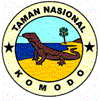|
Park Financing At present, basic funding for the
Park is provided through the Government of Indonesia. These funds, however, are insufficient to meet all the
management needs for the Park. Revenues from the Park are not fed back to
Park management resulting in limited incentive to increase infrastructure needed
to attract a greater number of eco-tourists. If park revenue was funneled
back into the Park, tourists would supply much needed revenue to the area. Komodo National Park has been selected by the Ministry of
Finance as a pilot site to test new Park financing mechanisms and privatization
of tourism management. The Komodo National Park management will conduct an assessment of options for restructuring tourist gate fees and reforming the gate fee distribution system within PKA, so that a significant portion of these fees can be channeled directly to Park management support. Following this assessment, the Park will work with partners to implement the gate fee reform as a way to fund future conservation activities in the Park. The most likely form of financial management system may be a Concession for Tourism Management. The Tourism Concession will be responsible for financial management, investments in Park infrastructure and marketing. It will require an initial outside infusion of funds (possibly from the Global Environmental Fund) to make the necessary Park improvements to justify later increases in user fees. After several years, the Park should be financially self-sustaining. The Tourism Concession will collect user fees and distribute the funds to the Park management. If successful, the concession could lay the foundation for expanding management activities to include additional aspects of Park management such as enforcement and sustainable community development projects. Economic success in the tourism sector will depend heavily on the maintenance of environmental quality. To sustain projected increases in tourism, any development must be compatible with the environmental surroundings. |


